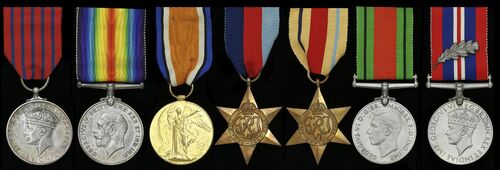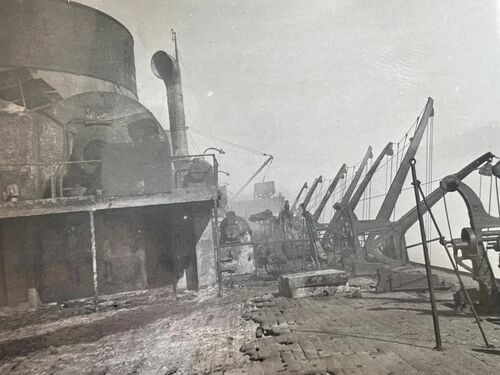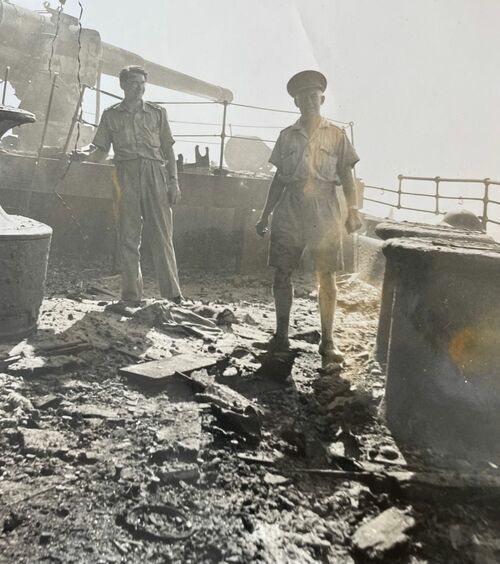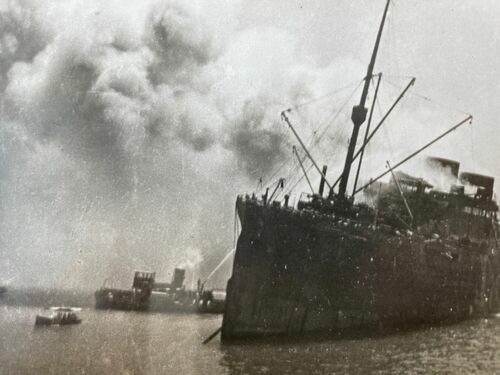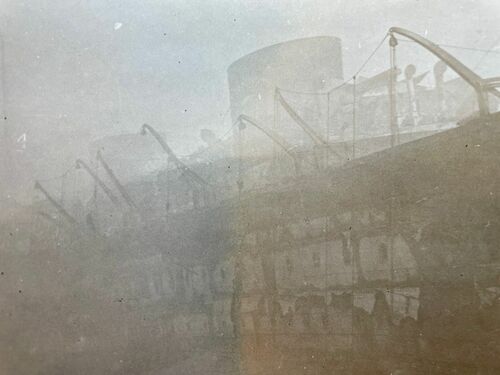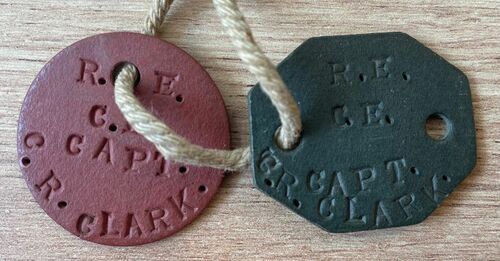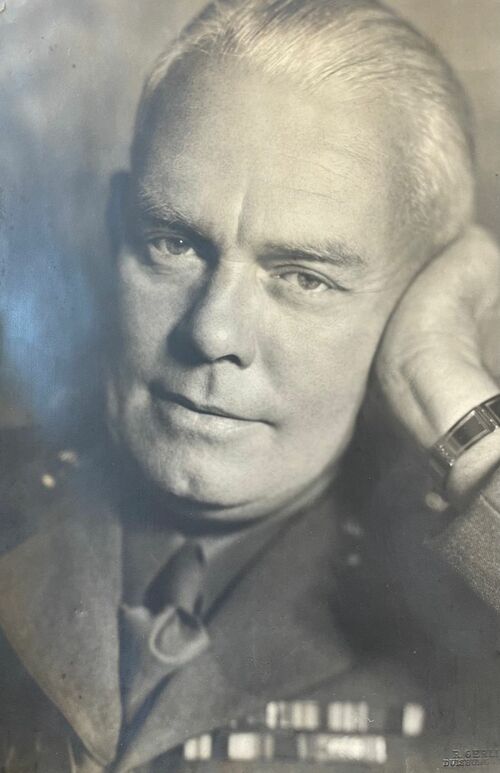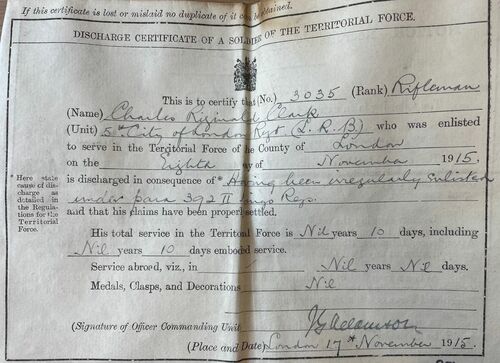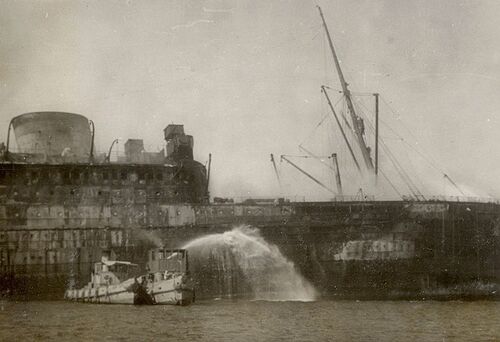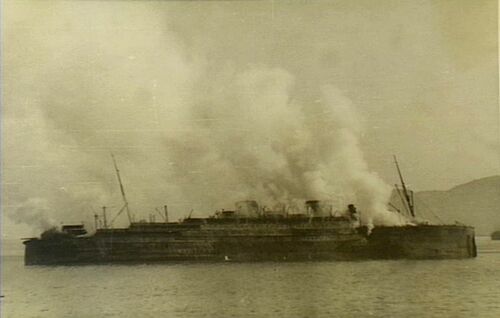Auction: 23002 - Orders, Decorations and Medals
Lot: 108
Sold by Order of a Direct Descendant
'My life is warming up here. For warmth I can personally recommend a salvage job on a blazing liner in the tropical sun. Very exciting, and it WAS warm! We did a job which it was said to be impossible to do. So what?'
Major Clark quoted in The Recorder, 21 November 1941.
An impressive 1941 Tank Salvage G.M. group of seven awarded to Colonel C. R. Clark, Royal Engineers, late London Regiment and Royal Flying Corps
Clark enlisted underage in the Great War and saw service with No. 16 Squadron on the Western Front before returning to his civilian life with the Port of London Authority - upon the outbreak of the Second World War he was quickly commissioned and earned his G.M. for his exceptional bravery in boarding and the taking off of a captured German Tank from the stricken, blazing and listing Georgic at Port Tewfik in July 1941 - he added a brace of 'mentions' for good measure before War's end
George Medal, G.VI.R. (Major Charles Reginald Clark. R.E.), on its original pin and with card box of issue; British War and Victory Medals (43581. 2.A.M. C. R. Clark. R.A.F.); 1939-45 Star; Africa Star; Defence and War Medals 1939-45, with M.I.D. oak leaves, these last four with their Army Council forwarding slip confirming '5' and named card box of issue, this addressed to 'Lt. Col. C. R. Clark. G.M., 'Vimy', Curtis Road, Hornchurch, Essex.', good very fine (7)
G.M. London Gazette 18 December 1941. Details of the action are perhaps best summarised in his own Report sent to the Commanding Officer of No. 3 Docks Group, Royal Engineers at Port Tewfik, 15 July 1941, the day of his G.M.-winning action:
'Following the bombing and consequential setting on fire of the MV Georgic on the 14th instant, it was decided to attempt to salvage the German Tank which was urgently required in the UK and had been loaded on board the ship on the morning of the 13th, before it was either lost overboard owing to the ship listing or rendered useless by fire.
The position was surveyed by Major Rigby and myself during the night of the 14th and it was decided owing to the fierceness of the fire and the darkness not to make an attempt before daylight the following morning. On the night of the 14th the ship appeared to have a list of something more than 15 degrees and was on fire throughout its whole length whilst explosions were frequently taking place aft where there was a large quantity of ammunition.
Volunteers to do the necessary slinging on board the ship were called for and the necessary arrangements made during the night, for bunkering the 30 Ton Floating Crane and provision of tugs, lighters and gear for the following morning.
On arriving at the ship this morning it was found the fire was nearly out aft and it was possible to board although forwards and amidships below, it was not yet under control but it was decided to make the attempt to lift the Tank by the 30 Ton crane as early as possible as it was feared the chocks placed there on loading might not continue indefinitely to prevent the tank from going over the side of the ship which by now listed considerably, or alternatively falling through the deck into the hold beneath which was still on fire. The lift was successfully accomplished and the Tank placed in a lighter by 1100hrs.'
M.I.D. London Gazette 30 December 1941 & 18 January 1944.
Charles Reginald Clark - or Nobby to his friends and comrades - was born at Ilford, Essex on 6 May 1898 and was educated at Ilford County School and Palmers School, Grays, where he served as a Sergeant in the School Cadet Corps from 30 September 1911-2 July 1914. He thence went to the City of London School and whilst underage, enlisted in the 5th (City of London) Battalion, London Regiment (London Rifle Brigade) on 8 November 1915 (No. 3035). He was discharged 10 days later when his age was discovered.
By 1916 he was working as a Clerk with the Port of London Authority and he enlisted in the Royal Flying Corps on 14 August 1916, becoming a Wireless Operator with No. 16 Squadron in France from 13 February 1917-23 January 1919, besides being admitted to the Canadian General Hospital, Etaples in December 1918. His Pair was issued in September 1921.
By the outbreak of the Second World War, he had worked for the Port of London Authority for some 24 years' and was a Discharging Officer in the Port Traffic Department. It can be no surprise he was commissioned 2nd Lieutenant in the Royal Engineers on 1 December 1939 and served with the British Expeditionary Force in France from 13 January-18 June 1940, being made Acting Major in July 1940. Posted to No. 1002 Docks Operating Company, he was embarked with his unit at Liverpool for Egypt in January 1941 and was posted to HQ 3 Docks Group at Port Tewfik in July 1941.
G.M. action
The Georgic was the last White Star Liner build before its merger with the Cunard Line. She was laid down in Belfast in 1931 and at the outbreak of the war was taken on as a troop ship by the Admiralty. Her first forays into action saw her taking troops off from Narvik, Brest and Saint-Nazaire, in the same event which the Lancastria was lost. Canadian troops were then ferried across the Atlantic before her tasks saw her sent to Egypt. By July 1941 she had dropped troops of the 50th (Northumbrian) Infantry Division at Port Tewfik and was waiting offshore to take on some 600 Italian Prisoners of War. Besides her human cargo, she was set to carry a German tank, freshly captured in the Western Desert, a vital opportunity to discover recent enemy weapons advancements. She was rounded on by German bombers flying off Crete, who were sweeping the area for targets, and they spotted the unprotected Georgic. An easy target, the proceeded to make their attack. At first there were several misses, but then she was hit by two bombs, the first bomb glanced off her side and exploded in the water, causing huge damage to the ship’s hull right next to No. 4 hold, resulting in heavy flooding. Then the second bomb hit the aft section of boat deck and it penetrated some five decks down, and it exploded in a lift shaft, causing massive damage to No. 5 hold. It was there a fire started that soon ignited fuel from ruptured fuel tanks; the fire spread rapidly and next it ignited ammunition that was stored in the aft holds causing an explosion, which engulfed the entire aft of the ship in a massive fire.
So it was that Clark and his gallant comrades entered the scene in order to save the Tank from loss, a vital piece of work which they took to '...under most unpleasant circumstances due to the heat and smoke from the fire.'
The Georgic slowly settled by the stern onto a shallow reef and was left to burn out over the next two days, and by that time she was half submerged, the engine room had partially flooded, and the superstructure was gutted by the fire. As the flames swept forward through the decks, the accommodations and finally the fire reached the bridge. Thus an order was given to abandon ship, and all on board managed to escape using the ships lifeboats. After allowing several weeks for the wreck to cool, she was boarded and remarkably refloated on 27 October. Having been tugged and towed to Karachi for extensive repairs, the Georgic made her first journey to Liverpool, arriving with some 5,000 tonnes of iron on 1 March 1943. Quite some journey.
Having been duly rewarded with a 'mention' and his G.M., Clark was made Acting Lieutenant-Colonel on 19 September 1942. He was latterly posted to No. 4 Docks Group and rose to its command by War's end and added a further 'mention' and a C-i-C's Commendation Certificate for his work in the Middle East to his laurels. Clark served with the British Army of the Rhine in Germany post-War and retired as Lieutenant-Colonel on 18 November 1948, having served as an Acting Colonel.
Sold together with the extensive original archive comprising:
(i)
His M.I.D, Royal Society of St George and C-in-C Commendation Certificates.
(ii)
Report on the Action, from which previously quoted.
(iii)
Great War Certificates of Demobilisation (Royal Air Force) and Discharge (London Regiment), together with forwarding letter for the Great War Medals.
(iv)
Commissioning Document as 2nd Lieutenant.
(v)
Letters and telegrams of congratulation on award of the George Medal.
(vi)
Series of reports and files on his work, of the Second World War period.
(vii)
An amusing Unofficial History of 951 Inland Water Transport Operating Company 9 November 1942-17 October 1945, Written by kind permission of one bottle of Scotch whiskey and a stolen Imperial Typewriter Mark IV. The cover marked 'Definitely Top Secret - to be burned before reading'.
(viii)
Letter, dated 3 October 1947 from his German driver, O. F. Jekenkelbenz, thanking him for their time together and wishing him well in his future, together with a photograph of him '...of the year 1940 to remember by your thankful driver.'
(ix)
His pressed card identity tags.
(x)
A selection of wartime photographs, letters, newspaper cuttings.
For his miniature dress medals, please see Lot 137.
Subject to 20% VAT on Buyer’s Premium. For more information please view Terms and Conditions for Buyers.
Sold for
£6,000
Starting price
£4800

